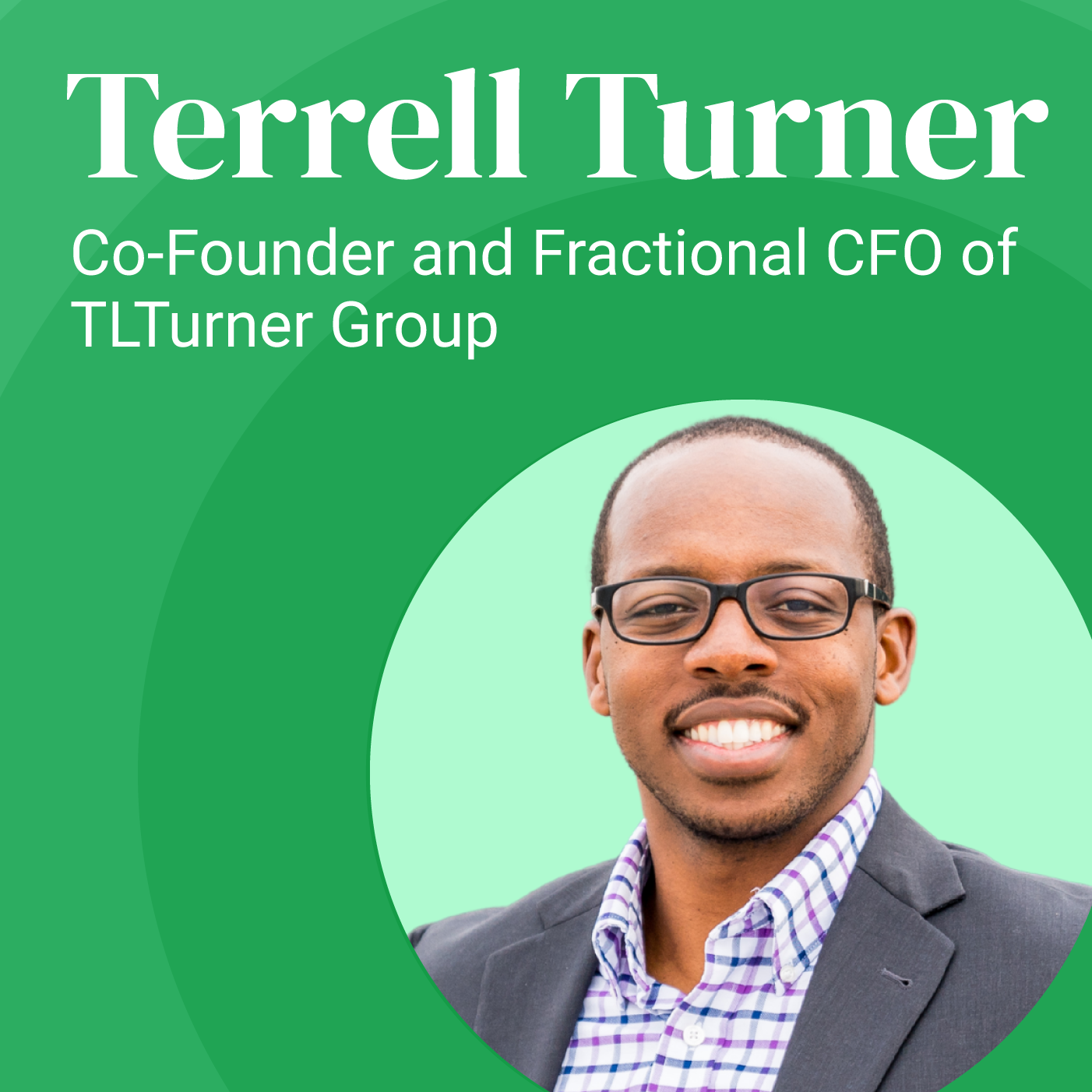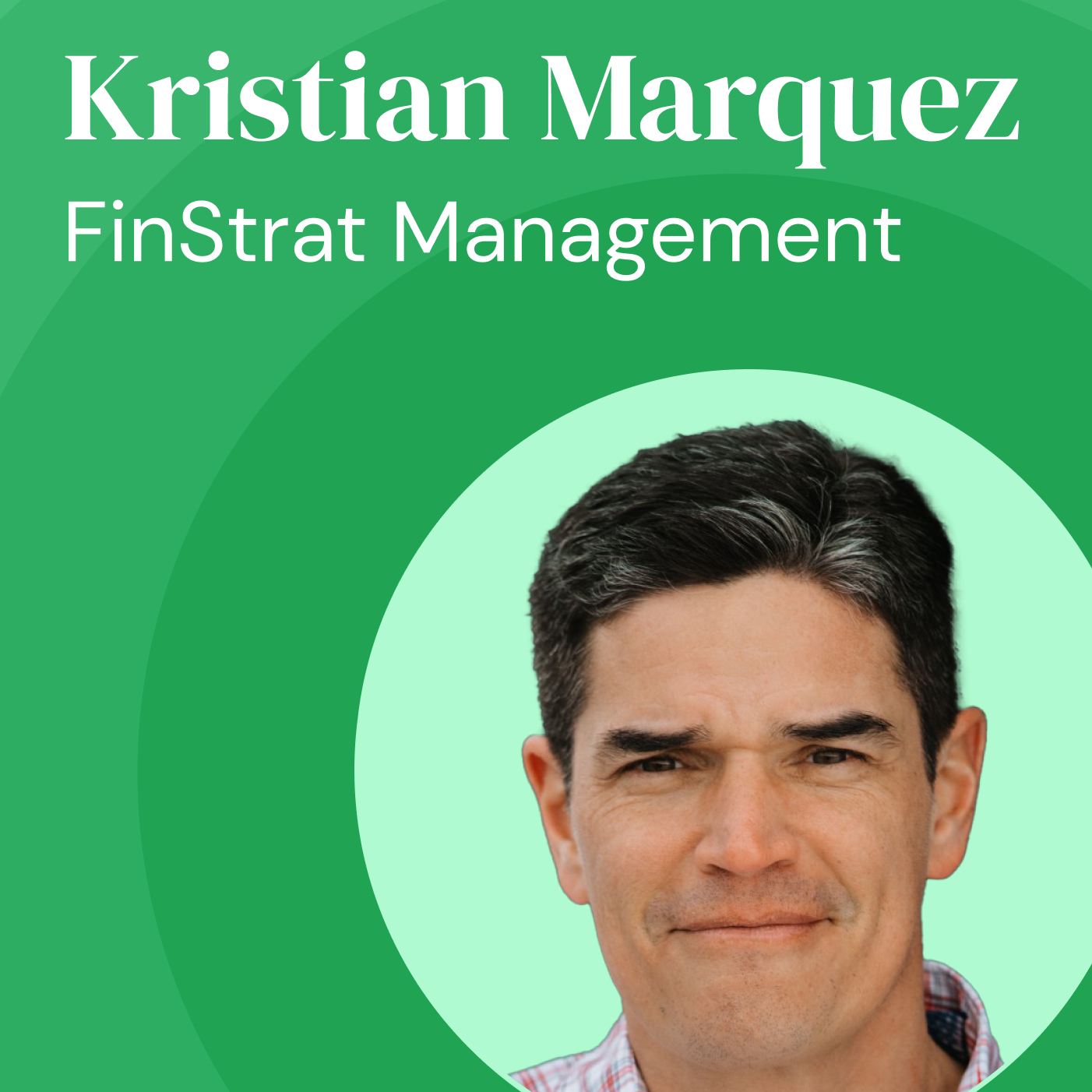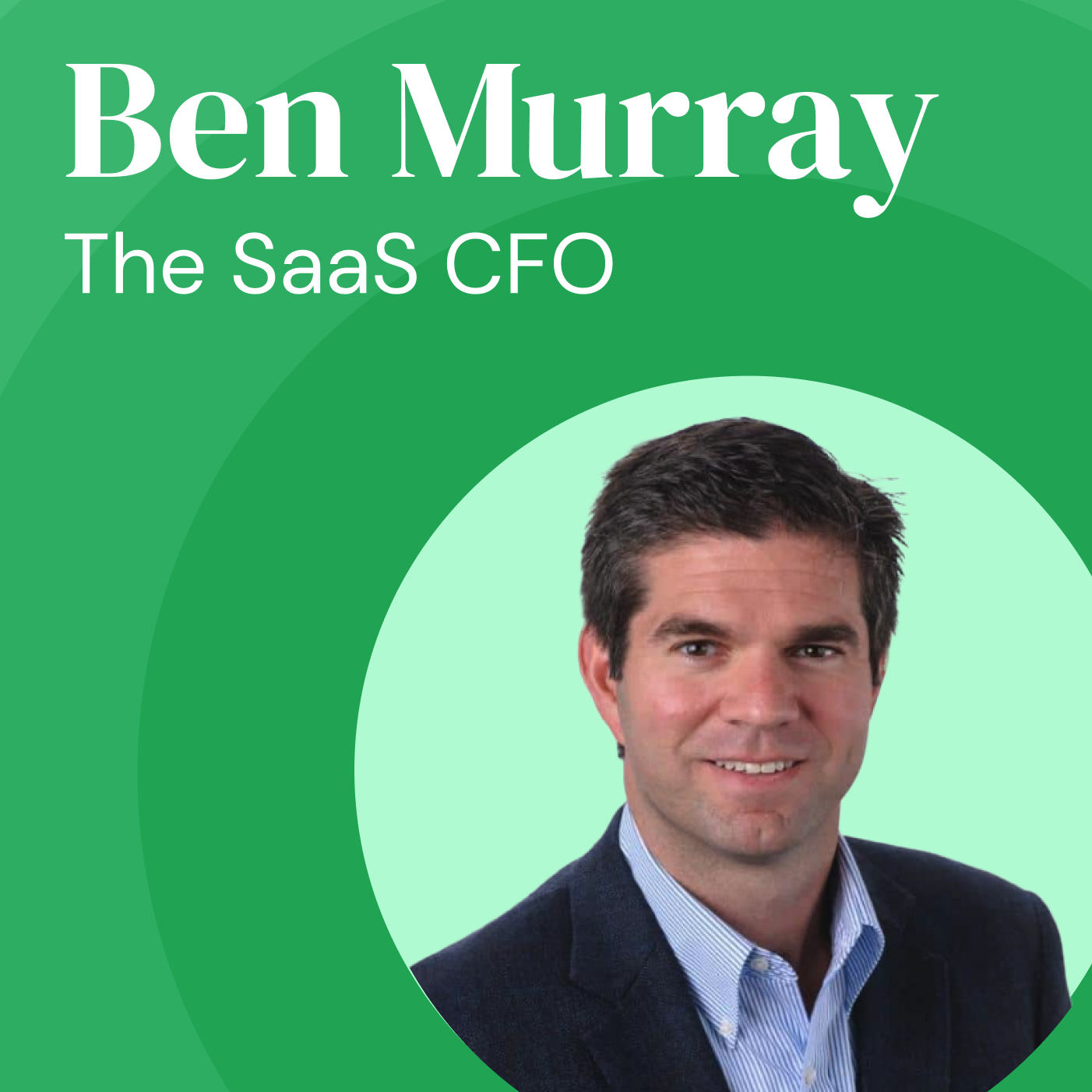Influencing Through Finance | Terrell Turner
- 0.5
- 1
- 1.25
- 1.5
- 1.75
- 2
- Hi, everyone. Welcome to the Being Planful Podcast. Today I'm joined by Terrell Turner Terrell runs his own organization, talking the language of money and runs his own podcast as well. And Tarell, I'd love you to, to introduce yourself talk about some of your experience in business and now what you're doing today for small business leaders.
- Absolutely. Yeah. So my background is accounting and finance. I, you know, studied business in undergrad got a graduate degree in accounting which should tell people a lot about me is that I can be a bit nerdy at times. I mean, if you've got a master's degree in accounting that's just part of the reality. So, but I just continued down that path worked in public accounting, work with big companies Fortune 500 companies like Navistar and General Electric and, you know, worked in the US as well as down in Brazil and did several different FP&A roles. And I did some accounting roles, but FP&A was kind of like the world that I really enjoy continue down that path. And then I became the director of FP&A, for a hypergrowth, a tech company. They were, you know, between during my time there they were between 30 to about 60 million in revenue and are just had the privilege of helping put together an FP&A team kind of building out what that team should look like and really having to work a lot with the non-finance team to break things down so they kind of understood what the numbers even meant.
- Yeah. That's always fun. And so tell me about what did you enjoy the world of FP&A more than accounting?
- Yeah, I mean, for me, accounting was it was a good start because, you know it gave you a chance to really dig in because I started from the auditing side. So gave me a chance to really dig in and figure out, okay how do I actually read a financial statement? How do I understand what was going on? But what I quickly realized is that I was interested in like, okay, how do I take this knowledge and then go do something about it? But when you're in accounting, that's not your job. So FP&A was that area where it allowed me to still you know, do what I was really good at with the numbers but then I could work with the operations team or the sales team to start coming up with strategies and saying like, "Hey, well, if we did this "this is how the results would look." And I could kind of drive the strategy a little bit that way, because in accounting, you just didn't do that. I mean, you waited for things to happen and then you did the accounting or you audit it and that was kind of the extent of it.
- Yeah, absolutely accounting being the very backwards looking version of what has happened and FP&A like what could happen and what do we want to happen being the forward looking version.
- [Terrell] Yeah.
- And I certainly believe in the more forward-looking version being more fun but you know, I'm not not trying to take anything away from the accountants. That's a really important job in making sure everything's done appropriately. But so speaking about, you know, your time, obviously at Fortune 500 organizations and then at much smaller kind of startup organizations, talk to me about the difference in structure that you saw with inside the FP&A teams, but the difference between the understanding and the intellectual graspable fine and it's from the business counterparts.
- Yeah. I would definitely send me from a structure standpoint. I mean, of course at your bigger companies, I mean, you had, you know, your FP&A team was a completely separate finance function. So where, you know, you had a full team of FP&A people that that's all they did and you know and it helped out a lot because they had the time to dig into more analysis. They can come up with run more scenarios and they would kind of communicate with the accounting team as well as you had some people that were on like the operational finance team. So you had these different layers of finance that could really help and spend more time digging into the details where then you go to a startup to where it sounds like you completely condense all that down to maybe like a couple people.
- Yeah.
- And it's just like, now, it's like, you have, like, for me it's like I was the FP&A team along with being the FP&A director as well as being the operational finance person. And then we had an accounting team which they did a lot of, you know, the backwards looking accounting, but it's like all of the forward looking stuff was handled by me. So it's just like, you didn't have as many people. I mean, now, fortunately, like I said I came from, you know, working in the environment where you had all those different layers and I was fortunate enough to be strategic to have worked through each of those layers. So I knew what each layer, what they brought to the table. So when I went to a startup I was able to play all the roles that I needed to play to still help the business move forward. But when you're in a smaller company, I can say, I mean you literally have to wear a ton of hats and you gotta know how to move between them. And then I think also on the operational side, I mean at a GE, I mean, they did a really good job of giving some of their non-finance team members training to help them understand the basics. Whereas when you go through a startup, everybody's running full speed at doing their thing, that they have very little time to learn or go home and read or go take a week off to go to a class to learn finance. So it's like you have to be the doer and the teacher at the same time when you're working in a small organization
- And also in the teaching is through doing right it's through that kind of sitting down and saying, "All right, well let's just work on "this model together "and I'm going to have to educate you as we go." This is the tough part too.
- Absolutely. Absolutely.
- And so when you talked about some of the layers that you saw at the at the big companies and thinking about you said that you've got the opportunity to work through those layers, was that an intentional decision from yourself or is that just kind of how your career progressed through larger organizations?
- Yeah, I mean, some of it was a mix of how it kind of progressed just through a larger organization and some of it was I did wanna get out of technical accounting. So that moved from me was strategic. It's just at the time I didn't know how many layers existed. I knew that I wanted to get out of the accounting to do a little bit more operational and so I was strategic about making that first step but I think once I made that first step and it it must've been like impressive to, you know the leaders that were making those decisions about it that were there. He said, Oh, well, if he's willing to make that step let me introduce him to these other things. So I went through a finance leadership program where you know, I started doing finance analysis in R and D. So working with the engineering team and doing a lot of the, what if scenario analysis of, okay what if we redesign this? Or what if we came up with this new feature? So a lot on and working with the marketing team of, "Hey, well what could we sell this for "if we came up with this "and running a ton of what if scenarios cashflow models, "MPVs and all of those great things?" And then, you know, the next layer was I moved into investor relations where I was working with the CEO and his staff of a Fortune 500 company and also being kind of like that link between the CEO staff and the wall street analysts. And for me it was a bit of a shock factor to be on the phone having to re-explain something to a wall street analyst like this could show up in the wall street journal. So, I need to make sure that I have what I'm saying, right? Because if I get quoted and it's wrong that could be very bad.
- Yeah. It really has a meaningful impact on the stock price. And I guess you have to have those numbers memorized all the time right?
- Absolutely. I think, yeah, there I would say that's where I would say my accounting knowledge really helped out a lot because at the time when we were like, you know some of the analysts which I didn't realize that some of the analysts didn't have a technical accounting background so they would have some questions about so why is this way? Or what do you mean by kind of like with the revenue recognition accounting to where I'm like, "Oh, I understand that better than you guys, "so I can break it down."
- Yeah.
- So I would break that stuff down. And even for like the, the CEO's staff, like some of his like his COO to where having to break down, Hey here's what this accounting standard means for us operationally. Here's how I would recommend you explain it the next time you get on a call or the next time you have to get on the stage. It's like just being able to see finance at that greater level. And like I said, it forced me to have to see finance from the eyes of a non-finance person as opposed to my typical background.
- Yeah. And I imagine going from that type of environment then into a startup that gave you a huge, probably advantage versus some folks that may not have seen the depth and breadth of SPNI maybe they've only ever worked in startups, but going from that enterprise focused doing a variety of roles then coming into a startup, you could use that experience in my mind I would imagine you could use that experience to then really just drop knowledge bombs across the organization, as you need to in order to kind of spur the momentum that a startup is really looking for.
- Yeah. It definitely did. I mean, it gave me a ton of perspective of and even as the CEO and the CFO of the startup that I was there, that we would talk about. And one of the things he said is, you know They were a little hesitant to pull the trigger 'cause they were like, "Okay you're coming from a big company." Typically you find a lot of people who come from big companies, they don't really do as well in a startup 'cause they're just not used to having to wear so many hats.
- Yeah.
- But they were like one of the big things that they really liked was like you've seen where we're trying to go. So it's like, you can point out things to where like, and unfortunate for me is like when I was at general electric I also did a couple of finance leader roles in some of their smaller business units, like a business that GE had acquired. So I kinda got kind of that ground floor level. like, how do we take this small business that they just bought to really get it up to the standard that the rest of the organization kind of operates? So being able to see like sit in meetings where they would talk about something like when the sales team would talk about, "Hey, this is what we wanna do it, "or these are the contracts." Is being able to say, "Okay, all right, two years from now "we're taking that approach would be a good approach "because if we sign that deal now "two years from now "will that be the right type of contract "for where the company's going?" And me being able to think through that and say, Hey maybe we should tweak this or tweak this. And in working with the legal team, it's like, Hey that language, we probably should keep that in mind. And just being able to bring that to the table was because I had the bigger enterprise level experience.
- Sure. Absolutely. And during your time at your startup, did you happen to fundraise at all so did your investor relations world come back straight at, you?
- You know, it did. I mean, when I first came in they had just bought another company for around 20 something million. So it was really all right. We just bought this new company. So I used that experience of like, Hey now we gotta get their processes up to speed with what we're doing and figure out what we're doing as a whole. Then we bought another company and then we went through raising about 65 plus million in private equity funding. So then the investor relations hat came back on and said "Okay all right, now that we've raised it "what type of reporting are we going to create?" "Because they wanna see regular updates "on where we're going." So that investor relations hat definitely came back on.
- Awesome. So I'm sure that was fun. So talk to me about maybe specifically at the startup world probably a little bit more relatable for most of it and most of our audience it's safe to say not everyone's here has been run the gamut of GE and some of those companies but the talk about that environment of trying to change or influence the business leadership into I know you talk about it on your podcast the idea of the language of money, right? Let's talk about how you kind of can leverage your accounting your finance skills to influence business leaders who might not necessarily understand something like, ASC 606 or IRFS and things like that. And talking to them, how did you manage to learn that? And be actually changed the school.
- Yeah. I mean, a lot of it came from spending time understanding their world because I mean in a small organization, everybody's wearing so many different hats to wear. In theory it's like they don't really have as much free time to sit down and listen to you explain something that they don't understand. It's just like they're running full speed. And there were like, you know, the marketing director when she was running full speed in her world. So what I had to do is create space in my schedule to sit in with some of her meetings to hear how she was thinking about, you know the marketing for the organization to hear the type of discussion she was having with her team and then go back and look at the numbers and say, "Okay how do I translate what I know "into something that makes sense for her." And it ended up having to do the same thing with the sales team and just attending some of their meetings and a lot of it came down to talking to the sales manager and told them, "Hey, I wanted to attend to meeting." Now at first, you know, it was strange because before me, no one had really ever brought that up to them and was like, "Well, why do you wanna do that?" Like, "Are you trying to check up on us/"
- Yeah.
- And having to explain, like I wanna understand the world the way you guys see it because when you know the CFO and I are coming in making recommendations we don't wanna give you guys an unrealistic target to hit. It was like I wanna understand the world from your perspective. So then we can start better educating, you know the rest of the business. So that things flow a lot better. So it came from a lot of sitting in attending non-finance meetings to hear how they thought about, you know, their job how they thought about their team and then having to go back and really say, "Okay, all right how do I translate what I do "into something that relates and make sense to them?" And it took a while to really build those relationships and to really start to mentally make those switches like, "Okay, all right how do I turn my sales brain on "when I'm looking at finance stuff?" And I wouldn't say that I was always perfect on it but it was definitely something that I worked there a lot.
- Yeah. It seems like in some cases there's a a business that is all speaking, you know, marketing speaking one language sales is speaking in other language, you know, engineering speaking another language, and you have to become the only person that can translate all of those languages into what you call the language of money.
- Absolutely. Because, I mean there were times where I would sit in meetings and because I had spent time working with the, you know the sales team where the engineering team would bring up an idea what they were trying to do. And I'm like, hold on. I remember the sales team was trying to do that. That's actually gonna hurt the sales team. So then I would be able to speak up and then also talk about the financial implication of it to where that really helped the sales team feel like, "Wow this guy's really is like on our team." "Like he's really trying to understand," because what the engineering team was saying was drastically gonna impact the sales team it's just, he didn't know how to translate what the engineering team was saying into his world but it's like me being kind of like that. I became like the Rosetta Stone.
- Well, I think we all did those language courses back in the day, and now it's much easier. You just get online and Google does it all for us right? Much easier now.
- Absolutely.
- But can you talk about do you have any specific experiences where someone didn't really understand the core concept of finance and you're able to educate them and therefore make a big impact on the team or on the department?
- Yeah I think with the sales team where, you know when sales team was thinking about it like in some respects, and I've seen this at even at some of your larger Fortune 500 companies where the sales team they're compensated, you know, they get commissions based on the sales and the deals that they close. And so they're highly incentivized to do that. Now, at times they would be like, "Okay, all right this is a price point "that I know will help us close the deal." And then I would take a step back and say, "well that price point does not help the business." And the way you're trying to negotiate the terms of this is horrible cashflow implications for the business. So then having to try to explain to them like, "Hey the price point that you're trying to go forward with "is gonna hurt the business." But at the same time, they're thinking, "Well if I go any higher, it's gonna hurt my commissions." So then it's just like into like where I had to start. Okay. How do we figure out, how do we renegotiate this deal? And really having to explain and walk them through like, Hey here's the cost structure of that product and if you agree to these terms in this deal this is what it's gonna cost the business to support that. And after kind of walking them through that they started understanding like, Oh so whenever I tell them that we'll deliver in 10 days what that means is engineers have to we have to start paying outside engineers to work overtime to get this in 10 days, as opposed to like tell them we'll get it to them in 20 days. Like that 10 days makes a huge difference. And so having to explain that to them to where they can start being able to connect well every time you're talking about giving them an incentive or you know, something additional there's a price tag that comes with that and we're having to eat that cost. Yes it helps you close the big deal but you're adding all these layers of cost on. And as I started walking them through that, and then we got to the point where we kind of just built out what a kind of like a cell service like financial model or pricing model would look like. So this is what you're asking or this is what you wanna offer. Put these numbers in the model. The model will tell you whether that's gonna be profitable yes or no. So they can start to see, okay, all right. I can probably adjust here. Or maybe if I push this out, or maybe if I up-sale maybe if I sell them the base product and then upsell this, maybe this could work. And so I think of that really was an opportunity for me to really get out of my area, to really work with them, to help them understand something that they didn't to get a better results for the business.
- Yeah. I see that a lot in my revenue operations capacity where a lot of salespeople receive a price book and I don't understand why we've why an organization has come up with the price book the way it has, what are the levers? And so they don't know how to sell the value in some cases, right? They're just saying, "Oh, well the customer wants a fostering implementation." They don't understand the gives and the gets, right? So in your example, they're like, "Well the customer wants it faster." "I'll give it to them in 10 days for the same price." And it's like, well there's a value in getting a 10 days faster. So how do we sell that value that is in your example costs back to the business? And I think that's something that is really important for finance leaders to be able to not only break down like how we got to this pricing but the levers that people can pull within that to ultimately help the business. And, you know, if you can boil it down into a simple spreadsheet template or a model for someone that is easily plug and play you can really have a meaningful impact on A of the ASP of your future deals and even on the win ability of those deals because the sales people feel empowered to sell things and when salespeople are confident, man, I can do some amazing things.
- Absolutely. Because I think also to that, I mean there was some situations where, you know when the price book was created it was assuming that we would have let's say like this base piece of hardware but after spending some time with the sales team what they were finding is a lot of the customers were having specific requests for a different type of hardware. And the price book didn't have it didn't have an upsale ability in it. Like the price book didn't have that price separately. So they were, you know, following the price book and they were selling them this different hardware. But what we didn't realize until, like I said I started digging in like, Hey, we're losing money on this because this alternative hardware that they want costs more we just never accounted for it in our price book. So we went back in and came back and said, okay let's amend the price book and say, if they want this hardware, it's this price. If they want this hardware, Hey, this is this price. And when we started doing that, what we saw is like you know, the profitability started going up because we actually started pricing or selling the value and explaining like, Hey in our base product, you're getting this product. But if you want the upgraded version, because you're gonna get this additional incremental value is this price and customers were happy to pay that. I mean, the sales team, they were happy 'cause the you know, the total sales price went up. So their commissions went up and the business was happy because their profits went up. So, I mean, it was one of those things where, like I said just diving into their world and translating it back to numbers to say, okay, all right here's something we can do to help everybody in the scenario a lot better.
- Yeah. I think coming from what you just talked about, there was the biggest thing that I think, well, I know it would've made a difference is gaining that trust first where you sat in on a lot of those and marketing meetings and engineering meetings to gain the trust of the organization, then you've subsequently learned that there's this lever in the pricing model, which didn't exist, which new level which is a certain hardware type. And that's associated with value based on the prospect and the company. And you're able to introduce a new level in your pricing model and ultimately create more value for everyone right? And the customer's happier because they're getting the hardware that they want. The organization is happier because then, you know everything's going well. But if you had, have just seen that from an outside, you know, finance looking in you would have probably just said we just need to lift everything up right? We need to lift old prices rather than understanding there was a specific hardware level there that was easy to fix forever.
- Absolutely.
- So one of the things that, you know we talked about is let's face it, most business people I only wanna talk to finance when business people want something like head count more budget, or you know, we need more budget in the annual plan or there's something that, you know, is a concern or a caution, and generally it's more money, right? How do we get that conversation moving to from that, you know, request or triggered based conversation to the experience that you had at that organization where it seemed like you were a true business partner with a team. You're sitting in on their meetings. You're hoping God, and advising them throughout the course of the general day-to-day business. How should people think about becoming that business partner?
- Yeah, I think from the finance standpoint I think part of it's, you know, it's an ego thing that you have to get over because I remember having a conversation at a with one of my mentors and I worked at one of the Fortune 500 companies. And, you know, and I was explaining like, how, you know I really wanna be a business leader. And I mean, this was when I was really really young and very naive about things. And I was like, I wanna be a business leader. And he said, "Terrell I'm gonna be completely honest with you." It was like, you know, if you're in accounting and finance the highest level you will reach is the number two spot. It is the CEO job to make those final calls. Now your job is to help enable him to make better calls. You probably won't. If you stay in accounting and finance you won't be the decision maker at the very top. And he was like and you got to actually understand that and realize that. And for me, it was one of those wake up calls that I realized, like you know what that is, right. My job is to enable good decision-making. And I think after that conversation, and I tell other, you know, accounting and finance professionals it's like your job is to figure out opportunities that you find in the data to help those that are on the front lines, executing help them move forward and move closer to the goals and the targets that they're after. And so I think it definitely takes time of, like I said first understanding what goal does your, you know your revenue operations leader, have? Like what's the most important things to them? Like, what are their targets? I mean, even with the engineering team like what's important to them. And once you start to understand what's important to them then as you look at the numbers you will inevitably find opportunities. And it's just like bringing those ideas back to them even if they aren't ideas that the revenue leader or the sales leader, or the engineering leader uses the fact that they know that, "Hey, you know what "Terrell's over there looking "for opportunities to help me get where I'm going." It starts to build that level of trust to where then they may start to bring you in the conversations on the front end of like, "Hey, this is what we're thinking about doing "will this help us get us to our goal faster?" And I think, like I say, once you start to build that trust and they start to see, you know, see you as a as an ally towards their goal. I think, you know, it makes it a lot easier because I mean to be completely honest, most people when I first started coming to those meetings they were like, Oh, finances here. There's certain things we can't say. That's just how they that's how they see finance and accounting as a finance and accounting professionals are the police. So they're here for compliance reasons. They're not really here to help us fix things or they're not really here to help us move forward. But I think, you know on the finance professional side is like you got to start breaking that wall down by, you know first understand what are their priorities and then start bringing them back ideas like, "Hey I was looking at these numbers." Even if it's something as simple as, "Hey I created this new report that helps you see "how close you guys are moving to your goal." Just doing something that simple can start to let them know that, "Hey, this person is on our side."
- Yeah. I think what the key thing that I heard through that was start with them and their goals not with your version of the worlds, right? Which is a PNL or a budget or a forecast right? But if you start with the what's important to you? What's that? And then you can go away and track again, back to translation translated that into a finance view of the world and say, well, take, what's important to you. Now here's something that I think could help like to your point, wow, he's really now corner here. He's like, and especially if you did it in a way, which is like, well this is outside of the scope of our normal budget or a normal PNL or a normal forecast. And because as a finance professional you understand the unit economics of everything. So you're then able to say, well actually it would make a lot of fiscal sense if we invested in this thing, because we could get extra turn and a lot of business people, that here's a shocking fact also don't think that you can go outside of the budget. right? They're like, "Oh, I just go give him this envelope "and that's all I get for the year." And so I would advise other finance folks to realize that you can go outside of a budget. We all know that. But the business people would just think that's their envelope. They've got to stay within it or come under it. And they don't see FP&A or accounting professionals as the way of saying, well actually they'll help me justify this and get more investment or get ways outside of the normal bounds that I've been constrained by in the annual plan.
- No, I think that's the completely true. I mean, and doing that really also helped me, you know, bridge a huge gap with one of the sales leaders that I worked with because you know, when I took the time to understand the sales leader knew that he needed to hit a certain sales number. He needed to hit a certain ARR number. And so one of the things that I did is I ended, okay, all right. I take your ARR number and we translate that into we say, okay, the average customer we bring on board does about this much ARR. So you need to bring on, you know 12 new customers to be able to hit your number. And then I just kinda started working it backwards like for you to bring on 12 new customers how many people do you need to talk to? Like, what are your conversion rates look like? And then we got that number. And we figured, okay, all right. If you needed to talk to, you know, 24 people to close 12 deals. And then I went talked to marketing and said, okay all right, how many leads are you targeted to bring in? And then the marketing team was only targeting to bring in 15 new leads. I'm like, well, you definitely aren't gonna hit your number. And it came down to, because the marketing team didn't have enough budget to go after, you know 25 to 26 leads. And I'm just like, all right maybe we need to like reconfigure the budget. And then so I'm like, maybe the marketing team needs more budget so they can feed more leads so that you can get those 24 people you need to talk to their closure, 12 deals. And it's like, until I sat down to go through that to connect the dots, you know, the marketing team and the sales team, you know, for some reason they hadn't been talking enough to realize like, you guys have the sales leader had an unrealistic goal because the marketing team wasn't gonna get them enough leads. But when they started realizing, and then, you know and I went with them too, you know, the leadership team and explained like, Hey, this is why we need to add more money here. And the leadership team went out and they figured out how to allocate more funding to the marketing team, the feed that pipeline. And from that experience, both the sales team as well as the marketing team were like. "Okay Terrell is on our side like we can trust him and we can trust that, hey, he's gonna actually, you know, make decisions or make calls or go do that for us to make sure we're doing what's right for the overall company and for the goals that we have to achieve.
- Yeah. I mean, that's a funny story. That's clearly a bit of a mishap in the whole annual planning process in terms of the goal setting and budget setting. I'm gonna assure you that that's what happened prior to your arrival, but, the interesting thing there is, they're so busy swimming in their own lanes with their own goals, right? Like, you know, someone's been asked to do I needed to swim. I said, swimming. So let's keep on the swimming analogy. Someone's made us to do breaststroke to get down to the other end of the pool. And someone else is doing freestyle. And it's like, hang on. They're both, still swimming different strives to get there. And they're aligned, but it's not gonna happen like that that race is a very different race. And it takes you to come along to observe from above to say, Oh, they're doing two completely different sports, even though it's in a pool and they're in the same time and doing everything, it's a no contest. it's really interesting how often that actually happens in organizations as everyone is just super busy doing their own thing.
- Absolutely. I mean, I definitely think it happens more often than it should, because I mean, things like that happen at the startup level, even when I think back to, you know times of working in Fortune 500 companies. I saw that happen several times at Fortune 500 companies. So where it's just like, you know, having to get in there and work through the leads or just work through the numbers. And even when I'd look at, you know, on a, like I said companies that were in like the manufacturing space where the sales team has sold, you know, X number of units. But when I look at the, you know, the supply chain, they only have enough inventory to do half of that. I'm like, well, you're not gonna be able to meet you know, a hundred percent delivery on that because and it's like going back, like, Hey we either need to reconfigure the budget or we gotta go find the additional money to close the gap, so that the organization as a whole can hit their target. And I think, like I said, a lot of it just became was a lot of people are only swimming in their lane and there aren't enough people that can see like, Hey, you know what? Well, lane one is doing a completely different stroke than lane two. Maybe we should probably tell them both, Hey, both of you guys need to do the same stroke. And then, like you said, you're actually in the same competition.
- Yeah and the important part is like, look, there's obviously things out there that can help connect those dots for organizations. There's software integrations there's all sorts of, you know, goal setting and alignment structures, and really helping businesses achieve that holistic vision where you know that we're gonna go X number of widgets to sell. So let's not sell set a comp plan up that incentivizes our reps to oversell, you know, Y number of widgets. But until you can get to that space, in your back office transformation where you can buy those tools, or build those integrations and have all that data flowing seamlessly to be super connected and super collaborative. FP&A needs to be that translation service and that kind of listening and advising sermons. Is there, any experiences Terrell where you can draw on where you've seen that just coming, right? No mistake everyone's just kind of flowing through or if you just it's. So to me it seems so normal no matter how high performing the organization, there's always gonna be a little error here or there because there are the running so fast, or the, you know, creating so much change that you can never keep up.
- Yeah. There was one smaller business unit within GE where I was a finance leader and you know, where things were humming very well. And we called it, it's like we use this method called the Lego method where we'd literally like on the shop floor to where every stage of the process we literally had Legos, and the different colors represented something different to where every morning when we'd go through is you stack the Lego's and say, okay, all right how many deals were in this phase of the process? And we would stack the number of Legos. So like at any given day, the team could go out there and look at the board and see what where are most of the Legos being bottlenecked or were most of the Lego sitting, or it's like, Hey the Legos I'm responsible for are they moving smoothly through the process? And I think being able to like, you know, bring it back to like a childhood toy for so many people to see physical Legos where it's just like it made it so simple for people to understand like, Oh, okay. When I do this is messing up that person down there but being able to visualize it that way. I think that was probably one of the experiences where I would say things were humming you know, they were just flowing well. And I think it really came back to like how do we break this down and have some something that does a very good visualization of what we individually know in our head but how do we put it down so that everybody can see a visual representation of the information we have in our head so everybody can follow the story that's going.
- I'm not sure how our listeners can do the Lego method in the current Zoom environment. But what, like, to me, that's so interesting. It's such a tactile visual, you know, you would feel really connected to that process 'cause you're literally connecting things as you're going. And that's really cool. I've never heard of anything like that, but yeah I'm sure Lego are online right now as well.
- I liked it. It seemed, it was something that was, it caught people's attention 'cause they're like 'cause everybody were like, Oh, we need to go to Lego land and when people come visit they'd be like, well, what is that? Well, let me show you. And they would be like, you guys literally have like Legos at work. And it's like, yeah. And then when we explained it to them, like in a matter of moments, I think when you have a very good visualization tool and in our case it was physical Legos. But when you have a very good visualization tool, it's like people, the learning curve that people need to understand what's going on, dramatically goes down. And so for me, it's one of those things that I carry through of like, okay, all right, how do we get some type of visualization? And whether it's using charts or, I mean whether it's using physical objects, if we can but it's just like, how do we break away from just throwing numbers on the board? So how do we get some visual to where when people look at it, they can quickly get an idea of what's going on. And they kinda know where they play into the whole process.
- Yeah, 100%. I think it's that whole, you know even engineers do this sometimes where they're all in a room together. They ditched the whole systemized process and they go back to the sticky notes on the white board or on the Christian pin board. And I just move the sticky notes on as to how things are going. And that just that tactile, you know really connected nature of, Oh, I can see my little object, is really powerful for folks. In terms of kind of how you see the future of findings. As you know, you talk on your your podcast business talk library, you talk to a lot of small business leaders and give advice to the more small business leaders. What do you see for the organizations that are kind of growing? And where do you think they should be looking to make their investments whether it be more FB&A heads to go create all those layers or is it more, you know, actually where do you see finance going for kind of small fast-growing organizations?
- Yeah. For a small fast-growing organizations. I definitely think their investment needs to definitely be in the tools that they have. Because in a smaller fast growing organization, you may not have the luxury of having a sales leader, sit and wait for, you know, the finance person, 'cause you may only be like one or maybe five finance people. They may not have the luxury of waiting for you to come around to them again, to where you need to have some type of tool that allows you to communicate, you know the relevant information to them. And almost a kind of a real time basis. You know, that there has to be some way and especially in this remote world that we're in, they may not be able to wait for you to hop on a Zoom before they close that next deal. So you need to have some type of tool that allows you to share information share the insights that you're learning from other parts of the business, because, you know, to be completely honest when an organization is thinking about growing, the finance team is usually not the one that gets, you know, the first pick of, Hey, we're gonna add more heads. I mean, that's usually not what happens.
- And So.
- Yeah. Its normally when things get to breaking point and that pull, or, you know, that single FP&A who's also kind of been doing the accounting or, you know, an outsourced accounting to someone else and someone's at breaking point, right?
- Yes. And so I think the way that the way that finance professionals can definitely get ahead of that, I think, is it starting to, you know to have tools that allow them to systemize some of the repeat things. So they spend less time doing, you know, the transactional backward looking things. It's just like, how do you get tools that can automate some of that? So you spend more time really looking at, hey, the what if scenarios and just kind of like, Hey before a decision is made, you being able to get somewhat of a glimpse, whether it's, you know, building a basic tool or basic framework that allows you to put in a few variables and then you can start to get an idea like, Hey what might this look like if we change these variables? Because I think that's what the rest of the business needs from the finance team. Because like I said a lot of the accounting background, accounting functions they are starting to be able to handle by technology. And as that happens, that just means that the accounting professionals need to move closer to the front line of decision-making while technology is filling the gap of the backroom stuff. And if finance professionals aren't ready to move closer to the front line, what's gonna happen is is the technology will overlap them. And all the non-finance people will start to ask, well if you're doing the same thing the technology is doing why should I come to you? And you start to lower that credibility and it damages the relationship of a value that can be added there.
- Yeah. I mean, there's so much that we can automate because it's routine and it's really low cognition work, right? Like, you know, certain something like Expensify, right? For a person, a human being is like, Oh, well I don't need to manually enter all the details of my expense report, because it's gonna scan and it's routine and it's automateable. And so that's also how you should be thinking. And, you know, to those listening think about all the, the manual repetitive, low value but low cognition things. Automate that as much as possible so that you can spend your time on the non-routine high value, high cognition work and try and figure out the boxes in between. Well, can I outsource that? Can I, systemize some of that? Can I offload that to the business leader? And figure it out that way 'cause then you're creating a structure whereby you're trying to remove all the manual work over time and you can't do it all at once so, you know, this isn't easy.
- Yeah. I mean, it's definitely not an easy task by any means. And so I definitely tell people to start thinking about like, you know, from a finance standpoint think about the system of how you're doing your job. Like, you know, thinking about the system of, you know, the people on your team. 'Cause you even run into it when it's time. You know, as a finance person, when you do get the budget to start to hire people it's just asking yourself, feels like, you know are you hiring someone to do a task or are you hiring a player to be a part of the team because what you do as a team will evolve. But if you only hire them to do this one task, well what happens when you figure out a system? Now you either have to reteach them a new skill or you got to go find somebody else or you have to fill in the gap of what they don't have until they get up to speed. So I always tell people, it's like think about the system of what you're doing. What can you automate? And then, like I said that the low cognition work, it's just like how do we get that to a point where we can automate it and sometimes automating that also means talking to the non-finance team members of maybe they need to make some tweaks in their processes that allows you to automate this step. But I think, you know, then again, it's, you know being a salesperson or being a, you know a person who can communicate the value and say, "Hey if you guys do it this way "it allows us to automate this function "so I can spend more time helping you sell more deals "or helping you get better pricing "or helping you do more analysis." And when I started doing that, like, you know the non-finance scenes were always willing to say, "Yeah we can tweak that." "If that means we'll get more of your time "to help us do this stuff on the front end "yeah we'll tweak what we're doing." So that flows automatically. And I think finance people have to start thinking about the system of what they do and less about the tasks that they're doing. Because as we move into the new world of business and things get faster and different decisions have to be made more rapidly, more real time the non-finance team they're gonna need their the wisdom that's in their finance person's head. But at that finance person is so busy doing you know, low cognition, you know, repetitive work they won't be there to actually help provide the insight and be the business partner that they should be.
- Well, Terrell I couldn't agree more with everything you just said there that's, you know exactly what I think businesses need from their FP&A leaders is a need that kind of that space for them to go off and, and think I know you talked about it earlier when you talked about what did you see the difference from the enterprise organization laws? It was that I had more time to be able to do those specifics and they were able to run more scenarios, do more analysis and therefore be more confident about the output. And that's what all business leaders are looking for. But you can't do any of that. If you've only got time to run one scenario and check that for us, before running two or three or four or even 20 different scenarios. And businesses owe it to themselves to unlock that strategic value that sits inside of finance people as well.
- Absolutely. I think it brings so much more peace to everybody involved in the process. When, you know, when the non-finance team members that are responsible for making a decision can make a decision more confidently because they were able to look at it from different scenarios. Like, "Hey, we ran five scenarios on this "and out of the five we ran, "this is the best outcome." As opposed to, "Well, I only had time to run one scenario." "I hope this is right." I mean, it's just like being able to run more makes them feel more confident as they move forward in those decisions.
- 100% well, Terrell this has been an awesome episode. I've loved having you on. I know our listeners will have done so as well. Do you wanna talk to the listeners about where they can hear more from me?
- Yeah, definitely. So the Business Talk Library is the kind of the content company that my wife and I create a lot of content for me. She's an executive with a Fortune 500 company and finance and accounting as well. And so we collaborate on a lot of different things that we've either done for other companies or we're currently doing or things that we're working through. And we share a lot of that insight just to really help small business owners, medium sized businesses really break things down and make it simpler so they can hear it and be like, "Okay, all right that makes sense." "I can go do something about that." And they can find that on businesstalklibrary.com.
- Awesome. Terrell well, thank you so much for being on Being Planful and hope to chat to you soon.
- Thank you for having me.
DESCRIPTION
On this episode, Rowan is joined by Co-Founder and Fractional CFO of TLTurner Group and host of the "Business Talk Library" podcast, Terrell Turner. Join Terrell on a journey through his finance career, from Fortune 500 companies to start-ups, and all the tips and tricks he learned along the way. How are finance teams in Fortune 500 and start-ups structured differently? How can finance pros leverage their skills to influence business leaders? Tune in to find out these answers and more.









